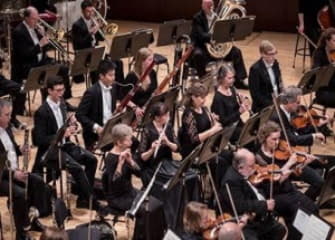
For many North Carolina Symphony (NCS) musicians, an upcoming program featuring Schubert’s Symphony No. 9 in C Major “The Great” and Mozart’s Piano Concerto No. 21 is one they have been looking forward to all season. Three performances take place April 27 through 29, at UNC-Chapel Hill’s Memorial Auditorium and downtown Raleigh’s Meymandi Concert Hall.
Beethoven’s Symphony No. 9 (which NCS performed April 20 through 23) and Schubert’s “Great” Symphony are theworks that define the transition between Classical and Romantic style in symphonic music. Everything became bigger, from the orchestra’s size, to the length of a symphony, to the emotion and drama, to the technical challenges.
"Schubert's ‘Great’ C-Major Symphony is one of the grand old "war-horses" of the orchestra repertoire—very demanding, yet deeply thrilling and satisfying to play,” saysFrench Horn player Christopher Caudill. “It's Schubert's answer to Beethoven's Ninth, and boy what an answer!"
Principal Trumpet Paul Randall agrees. “To me, the cornerstones of the classical repertoire are Mozart’s Symphony No. 41, Beethoven’s Ninth, Brahms’ Fourth, and Schubert’s Ninth,” he attests. “It's a giant work in scope, development, and length. This symphony is one of the reasons I wanted to become an orchestral musician.”Principal Trombone John Ilika also feels a personal connection to this work.“Trombonists live for the chance to play the Schubert Great C-Major Symphony,” he says. “Why? Because we actually have the melody!”
The program includes another one of classical music’s greatest hits—the Mozart Piano Concerto No. 21. Although the cheerful and outgoing concerto was an immediate success at its premiere, its popularity and renown spiked with the 1967 movie Elvira Madigan, which uses the second movement as its principal soundtrack. “Those of us who knew the concerto had to chuckle at the fact that it took a movie to popularize Mozart's great music even though it had been around almost 200 years!” says Principal Trombone John Pederson.
The guest soloist for the Mozart concerto, Shai Wosner, has been praised for his “lively and wise musicality” when performing Mozart (Pittsburgh Tribune). NPR’s All Things Considered has said of the Israeli-born pianist, “His fingers are at the service of a keen musical mind and deep musical soul.”
That musicality will certainly be indispensable in the Mozart, and the Symphony’s musicians are equally prepared to put their artistry on full display. “Any week our orchestra performs a Mozart piano concerto is a good week—Mozart's final dozen piano concertos reflect some of his most sublime compositions,” says Pederson. “The Concerto No. 21 contains some of the most elegant woodwind writing in the repertoire. As a woodwind player, I know that I better have my best reed in order to most effectively execute Mozart's exquisite phrasing and charm.”
The program will be led by guest conductor Tito Muñoz, who currently serves as Music Director of The Phoenix Symphony. Muñoz has led orchestras across the U.S., Europe, Asia, and South America, and will make his way to Raleigh to lead NCS for the first time this week.
At the Thursday performance in Chapel Hill, Dr. Letitia Glozer of UNC-Chapel Hill will give a pre-concert talk at 6:30 pm. On Friday and Saturday in Raleigh, pre-concert talks will take place at 7 pm with Associate Conductor John Glover and Dr. Jonathan Kramer of North Carolina State University.
The North Carolina Symphony expresses its appreciation to April 27 Concert Sponsor Carol Woods Retirement Community and April 29 Concert Sponsor Ross Lampe, Jr./Sitelink Software for their generous support. The April 29 concert is made possible in part by The Arthur and Campbell Moss Solo Artist Fund.
North Carolina Symphony
Classical Series
Schubert’s “The Great” Symphony
Thursday, April 27, 2017 at 7:30 pm (pre-concert talk at 6:30 pm)
Memorial Hall
UNC-Chapel Hill
Friday & Saturday, April 28 & 29, 2017 at 8:00 pm (pre-concert talks at 7 pm)
Meymandi Concert Hall
Duke Energy Center for the Performing Arts (Raleigh)
PERFORMERSNorth Carolina Symphony
Tito Muñoz, conductor
Shai Wosner, piano
PROGRAM
Mozart:Piano Concerto No. 21
Schubert:Symphony No. 9 “The Great”TICKETS START AT $18
Online: ncsymphony.org (TicketMaster fees apply)
By phone: 919.733.2750 ($8 processing fee applies)
In-person: NCS State Headquarters, 3700 Glenwood Ave., Suite 130, Raleigh (No processing fee)
About the North Carolina Symphony
Founded in 1932, the North Carolina Symphony (NCS) is a vital and honored component of North Carolina's cultural life. Its 175 concerts and events annually are greeted with enthusiasm by adults and schoolchildren in more than 90 North Carolina counties—in communities large and small, and in concert halls, auditoriums, gymnasiums, restaurants, clubs, and outdoor settings. The Symphony’s 66 full-time professional musicians perform under the artistic leadership of Music Director Grant Llewellyn.
NCS’s state headquarters venue is the spectacular Meymandi Concert Hall at the Duke Energy Center for the Performing Arts in downtown Raleigh. The Symphony’s service across the state includes series in Chapel Hill, Fayetteville, New Bern, Southern Pines, and Wilmington, as well as the Summerfest series at its summer home, the outdoor Koka Booth Amphitheatre in Cary.Collaborating with performers that range from classical artists, to banjo players, to jazz bands,NCS brings some of the world’s greatest talents to North Carolina.Committed to engaging students of all ages across North Carolina, NCS leads the most extensive education program of any U.S. orchestra. In alignment with the curriculum set by the North Carolina Department of Public Instruction, the Symphony provides training and resources for teachers, sends small ensembles into classrooms, and presents full-orchestra Education Concerts experienced by more than 55,000 4th and 5th graders each year. Music Discoveryfor preschoolers combines music with storytelling, and at the middle and high school levels, students have opportunities to work directly with NCS artists and perform for NCS audiences.
NCS is dedicated to giving voice to new art, and has presented 47 U.S. or world premieres in its history. In March 2017, NCS appeared at The John F. Kennedy Center for the Performing Arts in Washington, D.C., as one of four orchestras chosen for the inaugural year ofSHIFT: A Festival of American Orchestras—an honor that recognized the Symphony’s innovative community partnerships and creative programming that inspires increased interest in new music.
The first state-supported symphony in the country, NCS performs under the auspices of the North Carolina Department of Natural and Cultural Resources.






